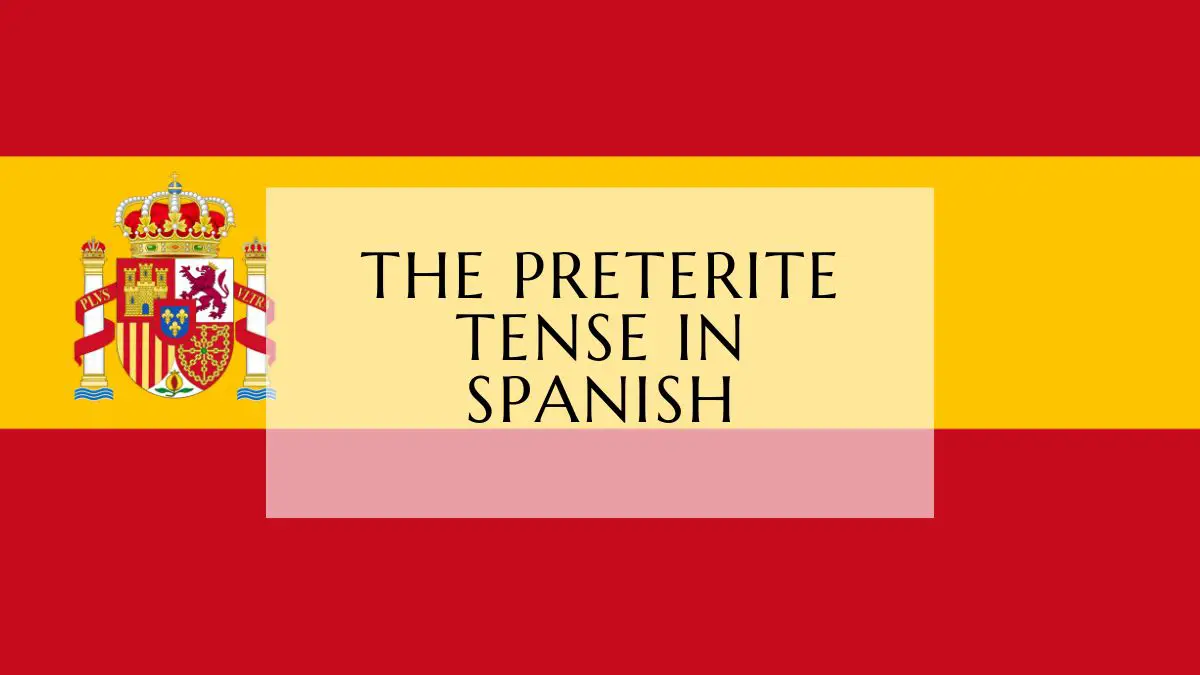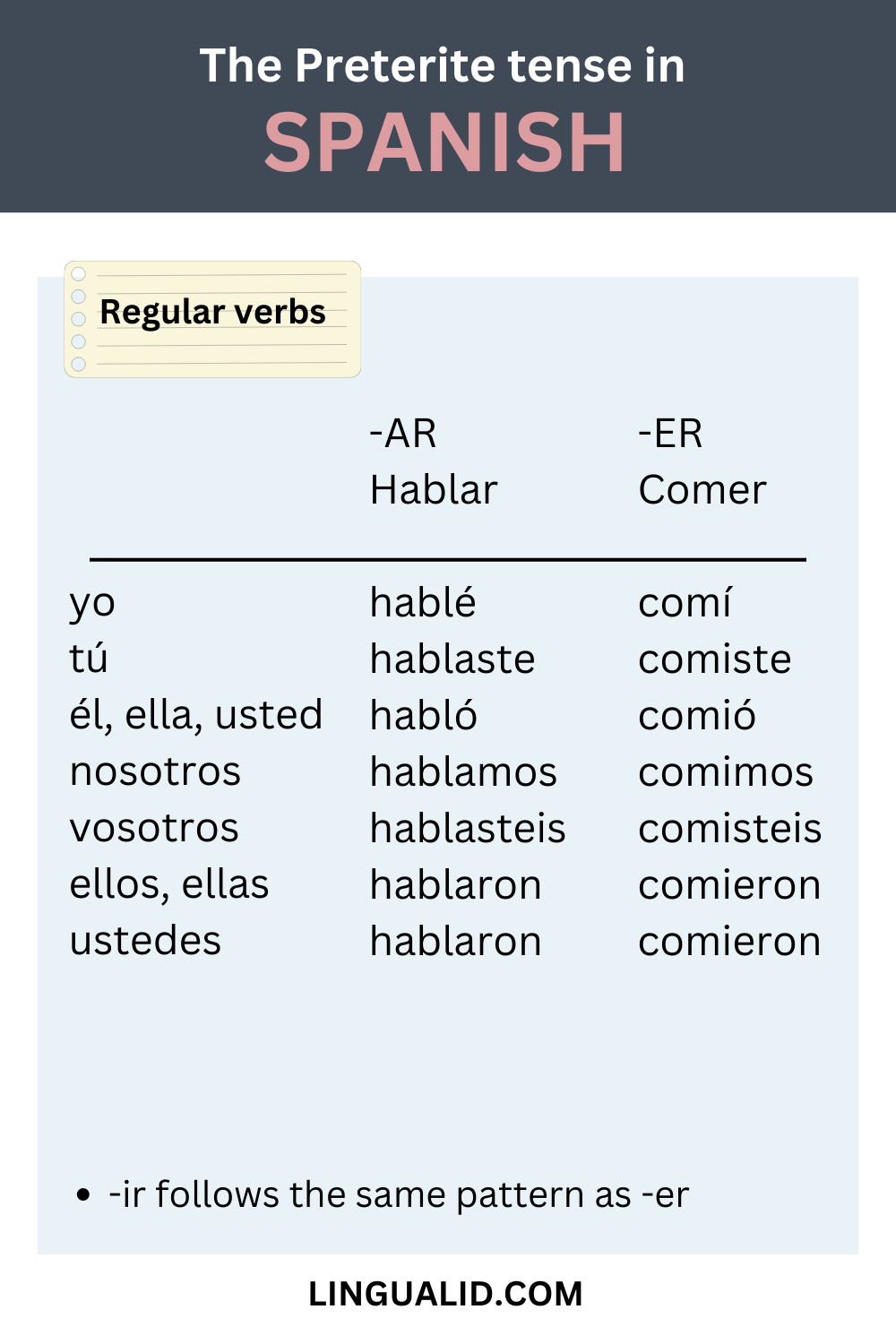The preterite tense in Spanish (El Pretérito Indefinido) is used to express an action in the past that is completed, (in a specific point in the past like yesterday) in this lesson we will talk about the conjugation of each type (-ar, -er and -ir) and give some examples.

Preterite Tense In Spanish
There are three types of endings (like we have seen previously in the present tense lesson) and the regular verbs follow these patterns:
Verbs that end with -ar
| Yo | -é |
| Tú | -aste |
| Él/ ella | -ó |
| Usted | -ó |
| Nosotros / Nosotras | -amos |
| Vosotros / Vosotras | -asteis |
| Ellos / Ellas | -aron |
| Ustedes | -aron |
Example: Estudiar (to study):
| Yo | estudié |
| Tú | estudiaste |
| Él/ ella | estudió |
| Usted | estudió |
| Nosotros / Nosotras | estudiamos |
| Vosotros / Vosotras | estudiasteis |
| Ellos / Ellas | estudiaron |
| Ustedes | estudiaron |
Example: Hablar (to speak)
| Yo | hablé |
| Tú | hablaste |
| Él/ ella | habló |
| Usted | habló |
| Nosotros / Nosotras | hablamos |
| Vosotros / Vosotras | hablasteis |
| Ellos / Ellas | hablaron |
| Ustedes | hablaron |
Verbs that end with -er and -ir
| Yo | -í |
| Tú | -iste |
| Él/ ella | -ió |
| Usted | -ió |
| Nosotros / Nosotras | -imos |
| Vosotros / Vosotras | -isteis |
| Ellos / Ellas | -ieron |
| Ustedes | -ieron |
Example: aprender (to learn)
| Yo | aprendí |
| Tú | aprendiste |
| Él/ ella | aprendió |
| Usted | aprendió |
| Nosotros / Nosotras | aprendimos |
| Vosotros / Vosotras | aprendisteis |
| Ellos / Ellas | aprendieron |
| Ustedes | aprendieron |
Example: comer (to eat)
| Yo | comí |
| Tú | comiste |
| Él/ ella | comió |
| Usted | comió |
| Nosotros / Nosotras | comimos |
| Vosotros / Vosotras | comisteis |
| Ellos / Ellas | comieron |
| Ustedes | comieron |
Example: decidir (to decide)
| Yo | decidí |
| Tú | decidiste |
| Él/ ella | decidió |
| Usted | decidió |
| Nosotros / Nosotras | decidimos |
| Vosotros / Vosotras | decidisteis |
| Ellos / Ellas | decidieron |
| Ustedes | decidieron |
Example: partir (to leave)
| Yo | partí |
| Tú | partiste |
| Él/ ella | partió |
| Usted | partió |
| Nosotros / Nosotras | partimos |
| Vosotros / Vosotras | partisteis |
| Ellos / Ellas | partieron |
| Ustedes | partieron |
We normally use time expressions to indicate a specific time when the action took place, like:
Anoche – last night
Ayer – yesterday
La semana pasada – last week
Hace + period of time : hace dos meses ( two months ago)
Note: you can practice what you’ve learned here, and learn how to pronounce each of the words in our Memrise course here, don’t know how to use the platform or sign up? we’ve got you covered in this easy-to-follow tutorial here.
Some irregular verbs:
Ser and ir (to be and to go)
Notice that both have the same conjugation in the preterito indefinido:
| Yo | fui |
| Tú | fuiste |
| Él/ ella | fue |
| Usted | fue |
| Nosotros / Nosotras | fuimos |
| Vosotros / Vosotras | fuisteis |
| Ellos / Ellas | fueron |
| Ustedes | fueron |
Tener (to have)
| Yo | tuve |
| Tú | tuviste |
| Él/ ella | tuvo |
| Usted | tuvo |
| Nosotros / Nosotras | tuvimos |
| Vosotros / Vosotras | tuvisteis |
| Ellos / Ellas | tuvieron |
| Ustedes | tuvieron |
Venir (to come)
| Yo | vine |
| Tú | viniste |
| Él/ ella | vino |
| Usted | vino |
| Nosotros / Nosotras | vinimos |
| Vosotros / Vosotras | vinisteis |
| Ellos / Ellas | vinieron |
| Ustedes | vinieron |
Hacer (to do)
| Yo | hice |
| Tú | hiciste |
| Él/ ella | hizo |
| Usted | hizo |
| Nosotros / Nosotras | hicimos |
| Vosotros / Vosotras | hicisteis |
| Ellos / Ellas | hicieron |
| Ustedes | hicieron |
Estar (to be)
| Yo | estuve |
| Tú | estuviste |
| Él/ ella | estuvo |
| Usted | estuvo |
| Nosotros / Nosotras | estuvimos |
| Vosotros / Vosotras | estuvisteis |
| Ellos / Ellas | estuvieron |
| Ustedes | estuvieron |

Happy learning!
